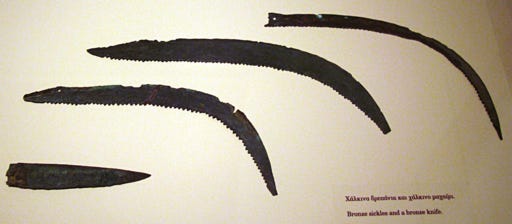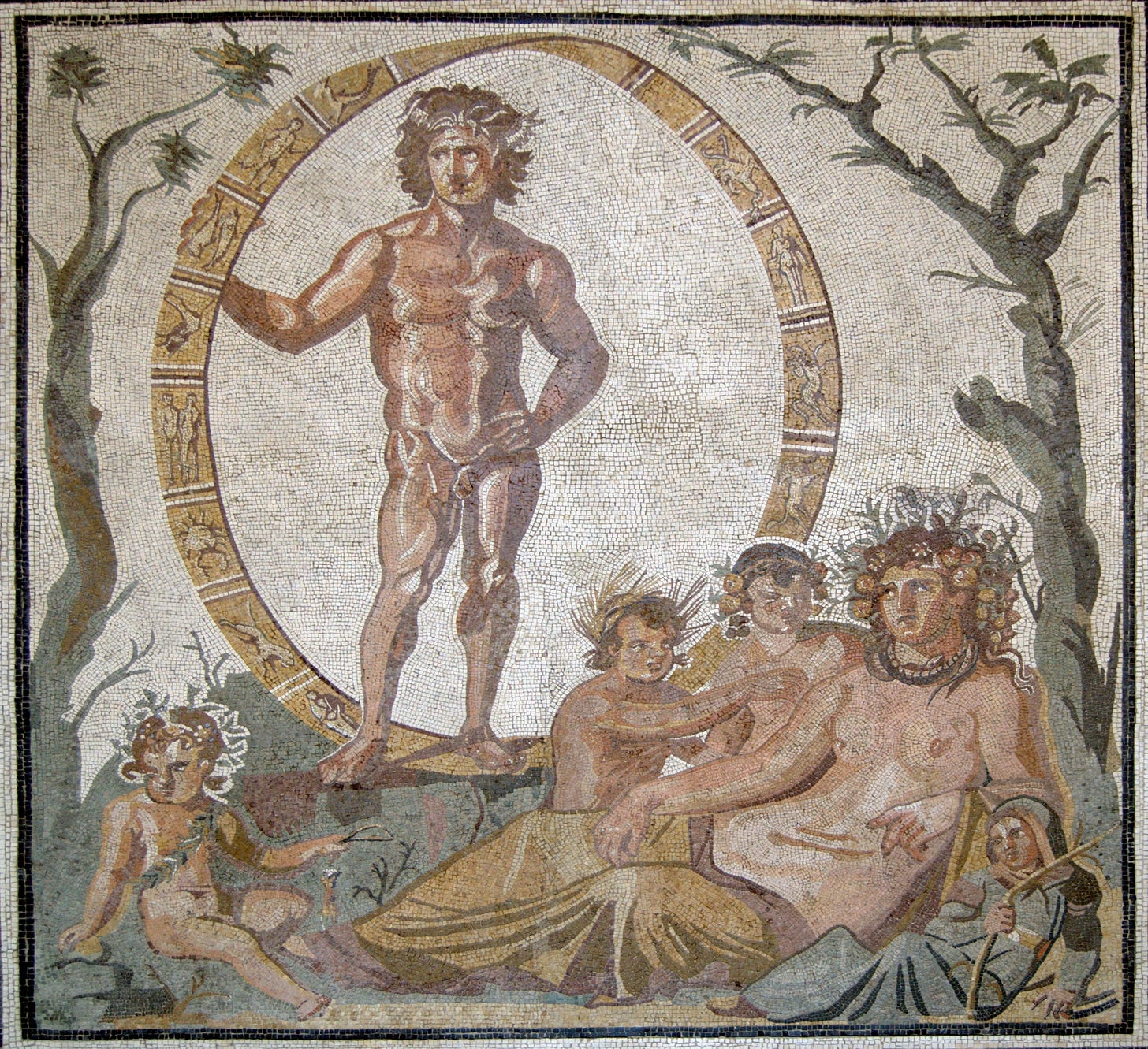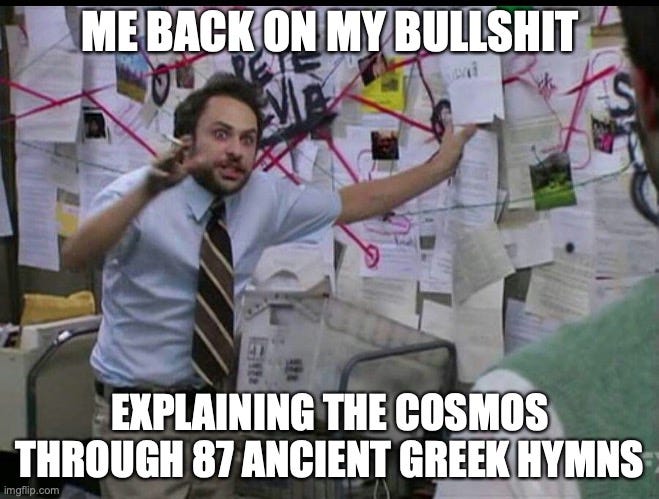A New Translation of the Orphic Hymn to Kronos (Saturn)
And Deep, Somewhat Trippy Thoughts on the Nature of Bodies and the Space-Time Continuum
*CW for brief description of genital mutilation in the context of myth.*
And also: a shameless plug to subscribe as a paid member if you are able. It helps me do this work, which is literally a full-time job.

Going Beyond Popular Myths about Saturn
Kronos, aka Saturn, is a hard one.
In popular astrology, He is often spoken about with fear and trembling. The “Greater Malefic,” he’s called, which I’ve always thought makes him sound like Ursula from the Little Mermaid. Or an aging drag House Mother. (Neither of whom I’d want to tangle with, honestly.)
And of course, there’s the dreaded “Saturn return” we go through when the planet returns to its starting point in our natal chart (when we’re about 29, and again at 58, and if we’re lucky, again at 86). These turning points are usually associated with hardships ranging from difficult reality checks, to massive lifestyle changes, to endings of relationships, illness, and even death.
In short, Saturn is often portrayed as some sort of King Ball-Breaker—which is actually not entirely inappropriate, given that, according to myth, He started out His life by castrating his own father Ouranos/Uranus (whose name means “Heaven” in ancient Greek).*
But this admittedly terrifying myth isn’t just all about fear. There are much deeper truths to be gleaned from it about the cosmic significance of Kronos/Saturn.
Others, including the imminently wise Diana Rose Harper (IG:@ddamascenaa), have written or spoken eloquently about the gifts that an active engagement with Saturn can bring. You should definitely check her stuff out if you’re someone struggling with Saturnian themes.
What I’d like to do here is a little different, though. What I want to do is look at Kronos through the lens of His Orphic Hymn, because it gives us a glimpse of the underlying cosmology of Kronos/Saturn. How getting to know and appreciate Him through the Hymn can help us make sense of everything just a little bit better, including our own role in the Grand Scheme of Things.™
A Brief Recap of the Kronos Myth
To make a long and complex set of varying myths relatively short, Kronos (which means “Time” in Greek) needed to rescue His siblings—collectively known as the Titans— from imprisonment in the belly of their mother Gaia, or Earth.
Gaia’s womb had been stopped up by Ouranos with his own rather formidable (ahem) appendage. He literally would not stop fucking Her and let Her Titan babies be born. (To be fair, the Titans were a surly bunch…they included the Cyclopes, for example, and when they were eventually released, they wound up wreaking havoc until they, in turn, were deposed by Zeus/Jupiter.) But since Gaia understandably wanted a break from Ouranos’ eternal prick (and her own eternal pregnancy), she plotted with one of her Titan children, Kronos, to come to everyone’s rescue.
Kronos’ method was simple, but effective: He took an adamantine sickle, chopped off Ouranos’ genitalia, and liberated both Gaia and Her children. (The spurting sperm from Ouranos’ castrated genitals produced the sea-foam out of which Heavenly Aphrodite would be born. But that’s a story for another time.)
Kronos then became King Himself, modeling His reign on his father’s by swallowing his own children so they couldn’t inherit his Kingship. Once again, a tricky Queen (Rhea, which means “Flow,” or “Ease”) helped the trapped children escape. Instead of feeding Her consort Kronos the baby Zeus as she was supposed to, Rhea substituted Zeus with a rock wrapped in swaddling. Greedy Kronos gobbled it up, and Zeus was hidden away. He eventually grew up to become strong enough to force His father to vomit up all His other siblings, who became the Olympian gods.
So that’s the myth as we’ve come to know it. And certainly the Orphic Hymn to Kronos draws on its images and themes.**
Let’s look a little closer at a few of them now.

Kronos/Saturn as “Original Ancestor”
We’ll begin with one of Kronos’ most significant titles, or epithets: genarka, or founding/original ancestor of a family. (He likewise is called “Father of Gods and human males.”***)
So when we think about Kronos, we should first and foremost be thinking of a family. But which family? Who exactly are we talking about here?
The Hymn gives us a very clear answer: Us. All of us.
Not just (as in the very first line of the Hymn) the family of the gods, nor just the “family” (which is to say, genera or class) of human males, nor even of humans in general.
Rather, as we discover through the course of the Hymn, Kronos is the Original Ancestor of all beings who exist within the domain of space-time.
Kronos EMBODIES what we might call today the space-time continuum.
Let’s unpack that. Contemporary astrophysics tells us that space and time co-originate—that is, they arise simultaneously. Similarly, Kronos, in the Orphic Hymns, encompasses both space and time as two sides of the same coin. This is told to us in story form in His myth(s), where everything is one big sex-mush until Time literally carves out Space by creating Heaven and Earth as separate Beings.
So if Kronos IS space-time, then everything…EVERYTHING that exists in Heaven and Earth has Kronos as their original ancestor. Everything from the tiniest microorganism (even the extremely Saturnian tardigrade) to the farthest Fixed Stars (and the Zodiac and everything in between). We all exist here as bodies in space, in time, because of Him.

Living Inside the Belly of the Beast
But it’s not just that we live because of Kronos. We also live INSIDE of Him. We see this in the myth too—how Kronos goes on, once He’s King, to devour all His children.





